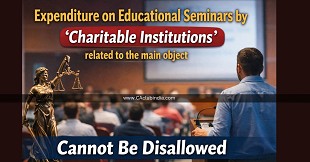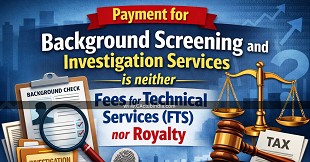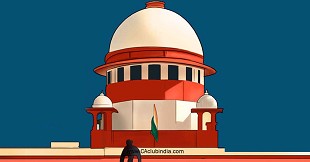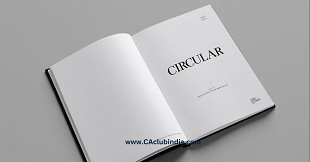Articles by Vivek Jalan
Expenditure on educational seminars by 'Charitable Institutions' related to the main object cannot be disallowed
Vivek Jalan 10 February 2026 at 06:50Chintan Shivirs serve as platforms for knowledge exchange through seminars and conferences. Learn how such educational activities align with Section 11 tax exemptions, key Supreme Court rulings and the limits on commercial receipts.
Payment for Background screening and Investigation Services is neither Fees for Technical Services (FTS) nor Royalty
Vivek Jalan 09 February 2026 at 06:52ITAT Delhi rules that payments for background screening services are neither royalty nor FTS, as they do not involve the use of copyright or 'make available' technical knowledge.
Discounts and Incentives are not Unexplainable Cash Credits
Vivek Jalan 09 February 2026 at 06:52ITAT Chennai holds that discounts and incentives credited in books and linked to business activity cannot be treated as unexplained cash credits under Section 68 or taxed under Section 115BBE.
Section 69C vs Section 105 of ITA 2025: A Fundamental Shift in Tax Law
Vivek Jalan 22 December 2025 at 06:41Section 105 of ITA 2025 makes unexplained expenditure additions mandatory, replacing "may" with "shall" and removing judicial discretion under Section 69C.
Six-Year Time Limit for Refund Applies Only to Tax Paid, Not to Payments on Exempt Income
Vivek Jalan 19 December 2025 at 07:02Guided by Article 265 of the Constitution and the Gujarat High Court ruling in Lt. Col. Nikhil Subodh Gajjar (2025), this analysis explains why the six-year limitation under CBDT Circular No. 9/2015 may not apply where no tax was legally payable, with implications for exempt incomes, trusts, and non-profit organisations.
Accepted Quantum Order but Faced Penalty? Legal Remedies Under Section 271(1)(c) & 270A
Vivek Jalan 18 December 2025 at 06:57Acceptance of quantum additions does not automatically justify a penalty under Sections 271(1)(c) or 270A. Learn why AOs must clearly specify concealment, inaccurate particulars, under-reporting or misreporting, and how assessees can effectively contest penalties even after quantum proceedings attain finality.
Section 36(1)(va) vs Section 43B: Deduction of Employees' PF/ESI After Checkmate Services
Vivek Jalan 13 December 2025 at 09:08Supreme Court in Checkmate Services held delayed employees' PF/ESI contribution is not deductible even if paid before ITR filing. ITAT allows 143(1)(a) adjustment, while Delhi HC has issued notice on the constitutional validity of Sections 2(24)(x) and 36(1)(va).
Corporate Guarantee vs Negative Lien: Key Transfer Pricing Clarification by ITAT Delhi
Vivek Jalan 01 December 2025 at 06:47Understand why a negative lien is not a corporate guarantee and carries no transfer pricing implications, as clarified in the ITAT Delhi ruling in JOGPL Pvt Ltd.
Gujarat HC: Income Tax Dept Cannot Issue 148A Notices Solely on GST Dept Inputs
Vivek Jalan 27 November 2025 at 06:09High Courts warn the Income Tax Department against issuing 148A notices based solely on GST or Sales Tax Department data, stressing independent verification and inquiry.
Taxpayers Face Heat Over GSTR-3B Ineligible ITC Reporting: Circular 170 in Focus
Vivek Jalan 26 November 2025 at 06:21A detailed analysis of GST implications arising from Circular No. 170/02/2022, highlighting state-wise SGST notices, ITC reversal and disclosure requirements, time-bar challenges u/s 16(4), rectification limits under Section 39(9), and the growing importance of accurate GSTR-3B reporting to avoid litigation and penalties.
Popular Articles
- TDS Rate Chart For Tax Year 2026-27: With Revised Section Codes in Challans
- Interest Computation Changes under GST (Effective from January 2026)
- Revised Return Due Date Extension
- Tax Deduction Rules for Employee Contributions From April 2026
- TDS and TCS: The New Shields and Arrows of the Taxpayer
- Tax Calculation Slabs For FY 2025-26 (AY 26-27)
- Comprehensive Guide to Statutory, Tax & Regulatory Compliances for Hotels
- Section 144C Time-Limit Finally Clarified: No More Litigation on Draft vs Final Assessment Deadlines
Trending Online Classes
-
DT & Audit (Exam Oriented Fastrack Batch) - For May 26 Exams and onwards Full English
 CA Bhanwar Borana & CA Shubham Keswani
CA Bhanwar Borana & CA Shubham Keswani -
IDT LIVE Exam Oriented Batch | May 2026, Sept 2026 & Jan 2027
 CA Arpita Tulsyan
CA Arpita Tulsyan













 CAclubindia
CAclubindia
